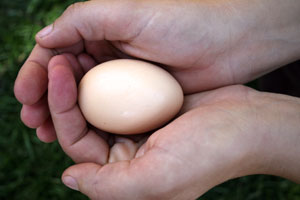 Yep, I love eggs: scrambled, poached, deviled, fried, boiled, and my favorite, egg in a basket. They are the perfect breakfast or power-ball snack. I also love the idea of purchasing eggs from farms that raise them with kindness and humanity, and that has proven a bit challenging. There are many terms to decipher, but armed with correct information, we can all help chickens and still enjoy those eggs. The following chart gives information about a few local farms and is thanks to my favorite place to grocery shop, Rainbow Grocery.
Yep, I love eggs: scrambled, poached, deviled, fried, boiled, and my favorite, egg in a basket. They are the perfect breakfast or power-ball snack. I also love the idea of purchasing eggs from farms that raise them with kindness and humanity, and that has proven a bit challenging. There are many terms to decipher, but armed with correct information, we can all help chickens and still enjoy those eggs. The following chart gives information about a few local farms and is thanks to my favorite place to grocery shop, Rainbow Grocery.
| Rock Island | Judy's Family Farm | Uncle Eddies | Chino Valley | Organic Valley | Clover | Clover Organic | Marin Sun Farms | Eatwell Farms | Clark Summit | |
| Organic Feed | no | yes | no | yes | yes | no | yes | yes | yes | yes |
| Hormones, Antibiotics & other additives in chicken feed | no | no | no | no | no | no | no | no | no | no |
| Kept in Cages | no | no | no | no | no | no | no | no | no | no |
| Have access to outside | no | no | no | yes | yes | no | no | yes | yes | yes |
| Beaks clipped | yes | yes | yes | yes | yes | yes | yes | no | no | no |
| Forced molted | no | no | no | no | no | no | no | no | no | no |
Organic Fed / Certified Organic
All organic eggs are certified by the USDA. Organic eggs come from hens whose feed is free of pesticides, herbicides, fungicides, and commercial fertilizers. Organic chicken feed contains no animal byproducts and the hens have never been given antibiotics.
Hormones and Antibiotics:
